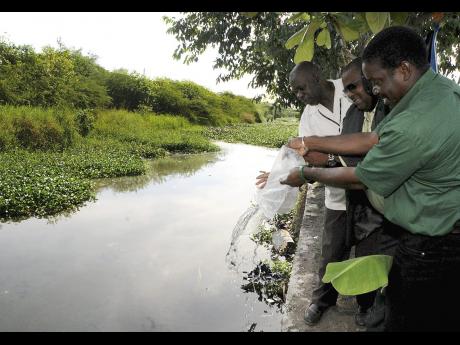Tiki Tiki fish being distributed to households islandwide to kill mosquito larvae
The Ministry of Health has collaborated with the agricultural ministry to distribute Gambusia, popularly known as tiki tiki fish, to households islandwide, to help reduce mosquito larvae as yet another government initiative to combat the Zika virus.
Director of the Health Promotion and Protection Unit at the ministry, Dr Sonia Copeland, who strongly believes that the days of fogging are over, made the declaration last week at a Gleaner Editors' Forum at the company's North Street offices in Kingston.
The forum was centred on the management of the Zika virus.
In December 2011, tiki tiki fish were introduced by the Ministry of Agriculture and Fisheries as
a vector-control method in communities in Portmore,
St Catherine, which had large volumes of water.
"We have collaborated with the Ministry of Agriculture. You'll remember these mosquito fish, the tiki tiki fish. These are being distributed to each parish (to help) persons who have any type of water source that is breeding mosquito," Copeland said.
"The fish will become full after a while, but the whole idea is to have a cycle of tiki tiki fish to remove the mosquito larvae," she said.
Copeland implored Jamaicans to make use of, and apply, basic solutions to ridding their homes of mosquitoes.
"Even as we look at some high technology, we want to remind persons of some very simple things that they can do. If they are storing water for domestic purposes, they can cover the drum with a mesh cover. They can (still) harvest the water, but they can also keep (mosquitoes) from laying in it. You can put basic cooking oil to form a film on the water in the drums so that even if it has larvae, they won't live long because air supply will be cut off," she stated.
HELPLINES AVAILABLE
Copeland also provided phone lines dedicated to disseminating information about Zika and pregnancy to pregnant women and their families.
"[On] those two numbers (537-1709 and 536-9125), we are beginning to get calls. Persons calling [so] we are able to disseminate information. You may have noticed some strategically placed billboards that we have at busy intersections."
Dr Christopher Tufton, minister of health, said that like some other countries, Jamaica could move towards ticketing persons for facilitating mosquito breeding within or around their homes.
He announced that more voluntary vector-control workers will be trained to assist the fight.
"The mosquito is the most deadly vector known to man and has killed more people than any other vector on the planet. In jurisdictions where it is a major issue, there is specialised focus and attention linked to university research, community action and even legislative framework. In some countries, you can actually be ticketed for having breeding sites in your home. So you could actually apply legislation to enforcement," the minister said.
He continued: "We had engaged 1,000 temporary workers. We rolled that over into a second phase. I want to announce that we are rolling it over for a third and fourth phase in the next six months (with) a phase being a quarter of a year. We have engaged HEART to train these persons. They are going to be certified as vector-control community aides."
Copeland said that the ministry is currently doing its assessment to see whether or not genetically modified organisms would work well in Jamaica to tackle mosquito breeding.

